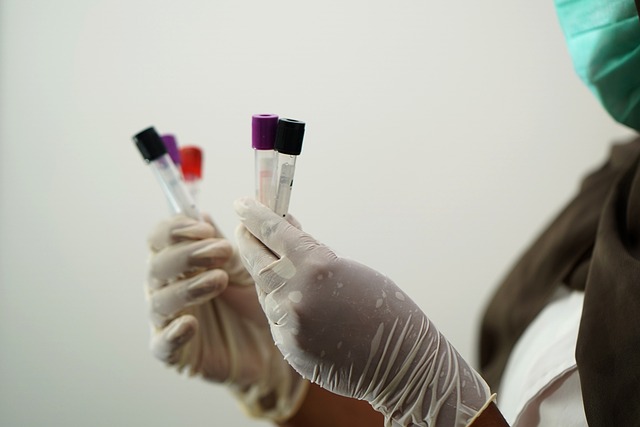Precision in Practice: Navigating Medical Record Translation Compliance in the UK
Medical record translation in the UK is a complex task that requires specialized knowledge and expertise. Translators must be proficient not only in the relevant languages but also understand the nuances of medical terminology, healthcare communicat…….

Medical record translation in the UK is a complex task that requires specialized knowledge and expertise. Translators must be proficient not only in the relevant languages but also understand the nuances of medical terminology, healthcare communication, and the cultural contexts within the UK's diverse linguistic landscape. The process is governed by stringent data protection laws like GDPR and the Data Protection Act 2018, which dictate the handling of sensitive medical information with utmost confidentiality. Advanced Translation Management Systems (TMS) and encryption methods are employed to ensure the security and integrity of patient data during translation. The integration of technology with human expertise is crucial in providing precise translations that are legally compliant and support optimal patient care outcomes across the UK's healthcare system. This synergy ensures that medical records remain accurate, reliable, and culturally sensitive, which is essential for maintaining trust and upholding the highest standards of patient care within the UK's medical documentation framework.
navigating the complexities of healthcare, precision in medical document translation emerges as a pivotal necessity within the UK’s authorities. This article delves into the critical role of accurate translations in upholding health regulations and maintaining patient safety. We explore the intricacies of the legal framework governing medical record translation, addressing key challenges such as language variations and cultural nuances. The integration of linguistic expertise, certified translation services, and advanced technology ensures the integrity of medical documents, safeguarding data protection and confidentiality. With a focus on best practices and ethical considerations, this discussion underscores the importance of quality assurance and continuous professional development for translators. As we examine case studies and compare translation practices across countries, the article highlights the financial and operational stakes at play in the medical documentation domain. Ultimately, the aim is to enhance trust and effective communication between patients and UK authorities through accurate translations.
- Understanding the Necessity of Precise Medical Document Translation in the UK
- The Role of Accurate Translations in Complying with UK Health Regulations
- Overview of the Legal Framework for Medical Record Translation in the UK
- Key Challenges in Translating Medical Documents for UK Authorities
- The Importance of Linguistic Expertise in Medical Document Translation
- Certified Translation Services: A Cornerstone for Medical Document Integrity
- Navigating Language Variations and Dialects in UK Medical Record Translation
- The Impact of Cultural Nuances on Medical Document Accuracy in the UK
- Ensuring Data Protection and Confidentiality in Medical Record Translation Processes
- Best Practices for Medical Document Translators Working with UK Authorities
Understanding the Necessity of Precise Medical Document Translation in the UK

In the UK’s multicultural society, the necessity for precise medical document translation is paramount, particularly within the National Health Service (NHS) and its affiliated healthcare providers. Medical Record Translation UK plays a pivotal role in ensuring that patients whose primary language is not English can access and comprehend their medical records with accuracy. This is crucial not only for patient safety but also for effective treatment outcomes. The translation of medical documents involves more than just word-for-word substitution; it requires a deep understanding of both the source and target languages, as well as the complex medical terminology that is often context-dependent. Healthcare professionals and translators must navigate the nuances of language to convey information accurately, avoiding misunderstandings or misinterpretations that could lead to adverse consequences for patients. The implications of incorrect translation in this sensitive field can be severe, potentially affecting patient care, legal compliance, and the integrity of research data. Thus, the reliability on skilled linguists who specialize in Medical Record Translation UK is essential to bridge the communication gap between healthcare providers and patients from diverse linguistic backgrounds, ultimately fostering a more inclusive and effective healthcare system within the UK.
The Role of Accurate Translations in Complying with UK Health Regulations

Accurate translations of medical documents are indispensable for UK authorities to ensure compliance with health regulations. The translation process in this context is not merely a linguistic exercise but a critical function that supports patient safety, legal obligations, and the effective functioning of healthcare systems. Medical record translation UK services must adhere to stringent standards to convey the precise intent and nuances present in original medical records. This is because health regulations, such as the UK’s General Data Protection Regulation (GDPR) and the NHS Constitution, demand that personal data is handled with utmost care, ensuring confidentiality and accuracy in every aspect of patient information management. Translators specializing in medical record translation UK must be proficient not only in the source and target languages but also in medical terminology to navigate the complexities of clinical documentation. This expertise ensures that translations are medically accurate, legally compliant, and culturally appropriate, facilitating seamless communication between healthcare providers, patients, and regulatory bodies within the UK’s multicultural landscape.
The integration of advanced technology and a deep understanding of medical practices is essential for maintaining the integrity of medical record translation in the UK. Utilizing cutting-edge software and certification processes, translation services can guarantee the highest quality translations that stand up to scrutiny from healthcare professionals, legal entities, and patients alike. The role of these translations extends beyond mere interpretation; they are a cornerstone in building trust within the healthcare system and ensuring that all individuals, regardless of language barriers, have access to high-quality medical care and information. This is paramount as the UK continues to embrace a diverse population with varying linguistic needs, making accurate translations not just a best practice but a necessity for upholding the highest standards in healthcare delivery.
Overview of the Legal Framework for Medical Record Translation in the UK

In the United Kingdom, the translation of medical records is a process governed by stringent legal frameworks designed to protect patient confidentiality and ensure the integrity of health information. The General Data Protection Regulation (GDPR), which complements the UK’s Data Protection Act 2018, mandates that all personal data, including medical records, are handled with care and in compliance with strict access controls. Translators working within this sphere must adhere to these regulations, maintaining the privacy of individuals whose records they handle. The UK’s National Health Service (NHS) has additional guidelines that emphasize the accuracy and confidentiality of medical record translation. These guidelines underscore the necessity for translators to not only possess linguistic proficiency but also a thorough understanding of medical terminology and concepts, ensuring that translations are both precise and contextually appropriate. The legal framework further requires that translated medical records be legally admissible and reflective of the original content’s intent and nuances. This is crucial for healthcare providers to make informed decisions regarding patient care and for legal purposes where medical histories are pertinent. Consequently, the UK has established quality assurance processes and professional standards for medical record translators, often requiring certification or accreditation through bodies such as the Institute of Translation and Interpreting (ITI) or the Chartered Institute of Linguists (CIOL). These measures ensure that the translation of medical records in the UK upholds the highest standards of accuracy and compliance with legal requirements.
Key Challenges in Translating Medical Documents for UK Authorities

Medical record translation within the UK context presents a complex array of challenges that require specialized knowledge and precision. The accuracy of medical document translations is paramount, as errors can lead to misdiagnoses, inappropriate treatments, or even patient harm. Translators must possess a deep understanding of both the source and target languages, as well as the medical terminology specific to each. This includes familiarity with the UK’s National Health Service (NHS) protocols, guidelines, and documentation standards. The linguistic nuances and cultural contexts inherent in medical language often necessitate more than a direct word-for-word translation; concepts must be accurately conveyed across different languages while maintaining the integrity of the original content.
Furthermore, due to the UK’s diverse patient demographic, translations may require proficiency in multiple languages and dialects. Additionally, translators must navigate various legal frameworks governing data protection and confidentiality, such as the UK General Data Protection Regulation (UK GDPR), which underscores the importance of secure and compliant translation processes. The implications for medical record translation are significant; it is a task that demands not only linguistic expertise but also an awareness of the regulatory landscape within which healthcare operates in the UK. This ensures that all parties involved—patients, healthcare providers, and regulatory bodies—can trust the translated documents to be both accurate and legally sound. Medical Record Translation UK services are crucial for facilitating effective communication across different languages, supporting equitable healthcare delivery, and safeguarding patient safety within the UK’s multicultural society.
The Importance of Linguistic Expertise in Medical Document Translation

In the realm of healthcare, the precision and clarity of medical record translation are paramount, especially within the UK’s diverse linguistic landscape. The nuances of language can significantly impact patient care and outcomes when health information is conveyed across different languages. Medical Record Translation UK services bridge this gap by employing expert translators with a deep understanding of both medical terminology and the subtleties of language. These linguistic experts undergo rigorous training to ensure that their translations accurately reflect the original content’s intent, tone, and context. This is crucial for maintaining the integrity of patient records, facilitating effective communication among healthcare providers, and ensuring compliance with UK regulations. The accuracy and reliability of these translations are not just a matter of semantics but a critical component in the delivery of safe and efficient patient care across multicultural settings. As such, investing in high-calibre Medical Record Translation UK services is an essential step for healthcare institutions to uphold their commitment to patient safety and regulatory compliance.
Certified Translation Services: A Cornerstone for Medical Document Integrity

In the UK’s National Health Service (NHS) and other healthcare providers, the integrity of medical documents is paramount for patient safety and effective treatment. Medical Record Translation UK plays a crucial role in ensuring that patients who come from diverse linguistic backgrounds receive care that accurately reflects their medical history. Certified Translation Services have become a cornerstone in this process, providing precise translations that adhere to legal standards and comply with the strict confidentiality required in the medical field. These services are staffed by expert linguists with specialized knowledge in medical terminology, ensuring that every nuance and critical detail is accurately conveyed from one language to another. This level of expertise is not just about linguistic proficiency; it involves a deep understanding of the context and cultural nuances that can affect interpretation. As such, certified translation services are indispensable for maintaining the quality and accuracy of medical records during translation, thereby upholding the trust patients place in the NHS and its affiliated institutions.
The importance of Medical Record Translation UK cannot be overstated, given the high stakes involved in healthcare settings. Certified translators are not merely interchanging words from one language to another; they are bridging the gap between patients and healthcare providers, ensuring that every prescription, diagnosis, and treatment plan is accessible and understandable in the patient’s native language. The use of these services mitigates the risk of miscommunication and errors that could arise from inaccurate translations, ultimately safeguarding patient care and enhancing the effectiveness of medical interventions. With the increasing diversity of the UK population and the global nature of healthcare research and practice, the demand for reliable Medical Record Translation UK services is growing, underscoring their critical role in maintaining the highest standards of medical document integrity.
Navigating Language Variations and Dialects in UK Medical Record Translation

Medical document translation within the UK necessitates a nuanced approach due to the language variations and dialectal distinctions present across its constituent countries. The UK comprises England, Scotland, Wales, and Northern Ireland, each with its own linguistic characteristics that can influence medical terminology and vernacular. Translators specializing in UK medical record translation must be adept at navigating these differences to ensure accuracy and clarity. For instance, certain terms used in Scottish medical records may differ from those in English ones, not only because of language but also due to variations in healthcare practices and jargon specific to each region. Similarly, the devolution of political power within the UK has led to some healthcare services being devolved, necessitating translators to be aware of different policy frameworks and medical directives that apply across these nations.
The complexity of UK medical record translation is further compounded by the need to accurately transfer highly specialized content, where mistranslation could have significant consequences for patient care. The intricacies of medical language, combined with regional variations, demand a high level of expertise from translators. They must be well-versed in both the source and target languages, as well as the healthcare context, to provide accurate translations that uphold the integrity of the original records. This involves not only a technical understanding of medical terminology but also cultural competence to handle sensitive information appropriately within the legal and ethical frameworks governing medical data in the UK.
The Impact of Cultural Nuances on Medical Document Accuracy in the UK

The process of translating medical documents for UK authorities necessitates a profound understanding of both the source and target languages, as well as the cultural nuances inherent in healthcare communication. Medical record translation in the UK must extend beyond mere linguistic accuracy to encompass the subtleties of medical terminology, which often varies between countries due to differences in medical practices, regulatory frameworks, and healthcare standards. For instance, a condition may have different diagnostic criteria or treatment protocols in the UK compared to its country of origin. Translators must navigate these complexities to ensure that the integrity of patient care is upheld. A mistranslation could lead to misdiagnosis or incorrect treatment plans, potentially compromising patient safety. Therefore, employing specialist translators with expertise in both language and medical knowledge is paramount. These professionals are adept at interpreting cultural nuances that can affect the meaning of medical documents, thereby guaranteeing the accuracy and reliability of translated records for UK authorities.
The stakes are high when it comes to medical record translation within the UK. The accuracy of translations directly impacts patient care, outcomes, and ultimately, public health. Given the diversity of the UK’s population, with individuals from various cultural backgrounds, the importance of culturally sensitive and precise translations cannot be overstated. Medical document translation services that specialize in this field often utilize advanced technology and human expertise in tandem to provide nuanced and accurate translations. This hybrid approach ensures that all relevant cultural nuances are considered and accurately reflected in the translated documents, maintaining a standard of care that is both equitable and effective for all patients within the UK’s healthcare system.
Ensuring Data Protection and Confidentiality in Medical Record Translation Processes

The translation of medical records in the UK necessitates a robust framework to safeguard patient data protection and confidentiality. Given the sensitive nature of medical information, translators must adhere to stringent compliance standards, such as the General Data Protection Regulation (GDPR) and the UK’s Data Protection Act 2018. These legal benchmarks ensure that personal data is handled responsibly throughout the translation process, maintaining patient confidentiality and privacy. Translators specialising in medical record translation are not only tasked with accurate linguistic transfer but also with understanding the intricacies of healthcare documentation within the UK’s NHS system. This dual expertise ensures that translations are not only semantically precise but also legally compliant, providing authoritative bodies with reliable and secure information for decision-making processes.
Furthermore, the use of secure translation management systems (TMS) and advanced encryption methods further bolsters data protection. These systems facilitate a controlled and auditable workflow that tracks the progress of translations, while also ensuring that only authorised personnel have access to sensitive medical records. The integration of technology in medical record translation UK processes also enables the use of certified translation services, which provide an additional layer of trust and accountability. By combining human expertise with technological innovation, the translation of medical documents in the UK not only upholds confidentiality but also contributes to the accurate dissemination of healthcare information across different linguistic and cultural contexts.
Best Practices for Medical Document Translators Working with UK Authorities

Medical record translation within the UK necessitates a high degree of accuracy and cultural sensitivity due to the critical nature of the information being conveyed. Translators working with UK authorities must adhere to stringent standards to ensure that patient care is not compromised by miscommunication or errors in translation. Best practices for medical document translators include a thorough understanding of both the source and target languages, as well as the specific terminologies used in healthcare. This proficiency extends beyond mere linguistic ability to encompass knowledge of medical ethics, data protection laws such as GDPR, and the context-specific nuances that govern clinical documentation.
To uphold the integrity of medical record translation UK, translators must engage with a robust quality assurance process. This involves peer review mechanisms, utilization of specialized translation memory software, and continuous professional development to stay abreast of emerging practices and standards within the medical and regulatory environments. Additionally, translators should maintain familiarity with the healthcare systems of both the source and target countries, ensuring that cultural differences in medical practice do not lead to misinterpretation or misapplication of medical information. This level of expertise and commitment to excellence is paramount in maintaining the trust of UK authorities and safeguarding patient outcomes.
In the UK, the translation of medical documents is not just a matter of linguistic transfer but a critical aspect of patient care and regulatory compliance. The necessity for precise translations ensures that healthcare providers can deliver effective treatment and that authorities maintain oversight over health services. This article has delved into the intricacies of the legal framework, the challenges of language variations and cultural nuances, and the paramount importance of linguistic expertise in medical document translation. It is clear that certified translation services are indispensable for upholding the integrity of medical records, safeguarding data protection, and ensuring the highest standards of accuracy. Medical Record Translation UK professionals must adhere to best practices to navigate these complexities effectively. In conclusion, with a robust approach to medical document translation, the UK health sector can foster informed decision-making and maintain its commitment to quality healthcare for all patients.






